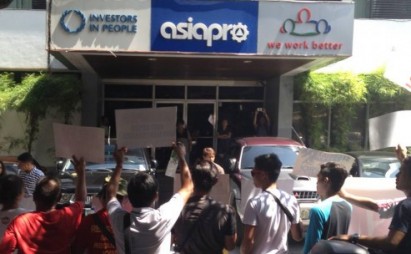LOCAL labor groups and even business leaders cried foul over the proposed “no work, no pay” policy that the Department of Labor and Employment (Dole) plans to implement for unvaccinated employees starting December 1, 2021.
A representative of the Trade Union Congress of the Philippines (TUCP) claims that the policy is a form of punishment and discrimination for employees who have not gotten vaccinated against the Coronavirus disease (Covid-19).
Alan Tanjusay, TUCP national spokesperson, said the national government should provide incentives to their employees in order to convince them to get vaccinated such as giving them paid leaves, financial bonuses, rice allowance, or simply providing shuttle services going to vaccination sites.
The Inter-Agency Task Force for the Management of Emerging Infectious Diseases (IATF) has issued Resolution 148 and 149 that would require all on-site employees to be vaccinated.
Labor Assistant Secretary Teresita Cucueco said in an online briefing on Monday, November 22, that employees who don’t want to get vaccinated may opt to undergo RT-PCR (reverse transcription-polymerase chain reaction) testing but the payment must come from their own pocket.
Cucueco added that the “No work, no pay” rule may be applied to on-site workers who refuse to be vaccinated and cannot present a negative RT-PCR test.
Aside from TUCP, the Associated Labor Unions (ALU) Central Visayas has condemned the move of the labor department, saying that vaccination is not mandatory under Republic Act 11525 or the Covid-19 Vaccination Program Act of 2021 that was signed by President Duterte in February 2021.
Lawyer Nora Ana Meterio-Diego, ALU Central Visayas vice president, told Sunstar Cebu that the government should shoulder the expenses for the swab testing and antigen test of unvaccinated employees.
“The government should incentivize rather than punish or deprive unvaccinated workers,” Diego said.
LOCAL labor groups and even business leaders cried foul over the proposed “no work, no pay” policy that the Department of Labor and Employment (Dole) plans to implement for unvaccinated employees starting December 1, 2021.
A representative of the Trade Union Congress of the Philippines (TUCP) claims that the policy is a form of punishment and discrimination for employees who have not gotten vaccinated against the Coronavirus disease (Covid-19).
Alan Tanjusay, TUCP national spokesperson, said the national government should provide incentives to their employees in order to convince them to get vaccinated such as giving them paid leaves, financial bonuses, rice allowance, or simply providing shuttle services going to vaccination sites.
The Inter-Agency Task Force for the Management of Emerging Infectious Diseases (IATF) has issued Resolution 148 and 149 that would require all on-site employees to be vaccinated.
Labor Assistant Secretary Teresita Cucueco said in an online briefing on Monday, November 22, that employees who don’t want to get vaccinated may opt to undergo RT-PCR (reverse transcription-polymerase chain reaction) testing but the payment must come from their own pocket.
Cucueco added that the “No work, no pay” rule may be applied to on-site workers who refuse to be vaccinated and cannot present a negative RT-PCR test.
Aside from TUCP, the Associated Labor Unions (ALU) Central Visayas has condemned the move of the labor department, saying that vaccination is not mandatory under Republic Act 11525 or the Covid-19 Vaccination Program Act of 2021 that was signed by President Duterte in February 2021.
Lawyer Nora Ana Meterio-Diego, ALU Central Visayas vice president, told Sunstar Cebu that the government should shoulder the expenses for the swab testing and antigen test of unvaccinated employees.
“The government should incentivize rather than punish or deprive unvaccinated workers,” Diego said.
Diego said this will be a disadvantage to workers who have allergic reactions and may face serious illness when inoculated with the vaccine.
The Federation of Free Workers also questioned the legality of the policy since it contradicts Section 12 of RA 11525 which bars the use of vaccine cards as a requirement for educational, employment and other similar government purposes.
The labor groups also urged employers not to wait for any directive from the government in giving incentives since this is for the welfare of their workforce.
On the management side, an official of the Filipino Cebuano Business Club (FilCeb) said that although they are for the vaccination of employees, implementing a “no work, no pay” rule for unvaccinated workers is a “counterproductive” move.
FilCeb chairman Rey Calooy said human resource (HR) personnel for various firms should offer incentives to workers or proper counseling to persuade them to get vaccinated.
“We need education within the company on the benefits of getting vaccinated. And the HR should understand why that particular employee won’t get vaccinated. Maybe that person has psychological hesitance or phobia that they can talk about,” he said.
Calooy said only a small group of employees remains unvaccinated. However, to pave the way for economic recovery, there should be understanding and assessment of employees who remain unvaccinated.
Calooy said instead of forcing them to get vaccinated, employers could offer their workers paid leave for a day just to convince them to get vaccinated or offer free rides to their workers if they are going to vaccination centers.
Meanwhile, Tanjusay added that they support the three-day national vaccination drive organized by the government and said that if November 29 and December 1 will be declared as special non-working holidays, then this is something that they would consider as an incentive for workers.
(IRT, JOB)




 A LABOR group expressed support for a Department of Health (DoH) policy that makes tests for the Acquired Immune Deficiency Syndrome (AIDS) optional for employees.
A LABOR group expressed support for a Department of Health (DoH) policy that makes tests for the Acquired Immune Deficiency Syndrome (AIDS) optional for employees.